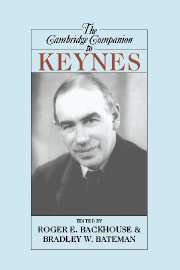Book contents
- Frontmatter
- 1 A cunning purchase: the life and work of Maynard Keynes
- 2 The Keynesian revolution
- 3 Keynes and the birth of modern macroeconomics
- 4 Keynes as a Marshallian
- 5 Doctor Keynes: economic theory in a diagnostic science
- 6 Keynes and British economic policy
- 7 Keynes and Cambridge
- 8 Keynes and his correspondence
- 9 Keynes and philosophers
- 10 Keynes’s political philosophy
- 11 Keynes and probability
- 12 The art of an ethical life: Keynes and Bloomsbury
- 13 Keynes and ethics
- 14 Keynes between modernism and post-modernism
- 15 Keynes and Keynesianism
- Bibliography
- Index
4 - Keynes as a Marshallian
Published online by Cambridge University Press: 28 November 2006
- Frontmatter
- 1 A cunning purchase: the life and work of Maynard Keynes
- 2 The Keynesian revolution
- 3 Keynes and the birth of modern macroeconomics
- 4 Keynes as a Marshallian
- 5 Doctor Keynes: economic theory in a diagnostic science
- 6 Keynes and British economic policy
- 7 Keynes and Cambridge
- 8 Keynes and his correspondence
- 9 Keynes and philosophers
- 10 Keynes’s political philosophy
- 11 Keynes and probability
- 12 The art of an ethical life: Keynes and Bloomsbury
- 13 Keynes and ethics
- 14 Keynes between modernism and post-modernism
- 15 Keynes and Keynesianism
- Bibliography
- Index
Summary
For forty or fifty years, twentieth-century macroeconomics was predominantly 'Keynesian' - in one sense or another. That era ended some twenty or thirty years ago. The leading macroeconomists of today think of Keynesian economics as altogether superseded, and few of them have much respect for Keynes himself. A common judgement is that the lack of 'microfoundations' has been the crucial weakness of Keynes's theory and that it has therefore not stood the test of time.
In matters of 'micro' (as it came to be called much later), Keynes had his theory from Alfred Marshall. Marshall had been his teacher and, while he had his reservations about Marshall's successor, A. C. Pigou, Keynes remained very much in the Cambridge tradition and continued to hold Marshall in the highest regard. Marshall's reputation among modern economists went into eclipse some decades before that of Keynes. Their fates are linked. Modern neo-classical economics has developed along a path very different from the course that Marshall had charted, and the conceptual gap has eventually become so wide that neither he nor Keynes is well understood by young economists with 'modern' training (Leijonhufvud 1998).
- Type
- Chapter
- Information
- The Cambridge Companion to Keynes , pp. 58 - 77Publisher: Cambridge University PressPrint publication year: 2006
- 20
- Cited by

